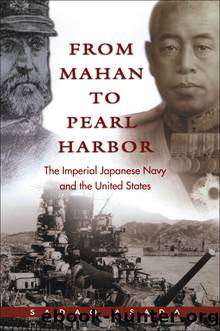From Mahan to Pearl Harbor by Sadao Asada

Author:Sadao Asada [Asada, Sadao]
Language: eng
Format: epub
ISBN: 9781612512952
Publisher: Naval Institute Press
THE NAVYâS SEARCH FOR PARITY
A deepening sense of isolation in the aftermath of Japanâs withdrawal from the League of Nations in March 1933, the crisis in relations with the United States, fear of American (or Anglo-American) intervention in the Far East, and uneasiness about the incipient U.S. naval buildup under President Franklin D. Rooseveltâall these factors combined to convince Japanese navy men that the Washington and London treaties had become outmoded and disadvantageous. From his first days in office, Roosevelt had backed a naval buildup as contributing to national recovery and making the United States the naval equal of Japan. Recent developments in air power were a new factor that made Japanâs defense more vulnerable.15 The navy believed that technological advances facilitated the American fleetâs transpacific passage and conversely made Japanâs attrition-interceptive strategy more difficult to implement.
Japan had traditionally contended that it needed a 70 percent ratio to have a fifty-fifty or slightly better chance in a main-fleet engagement in the western Pacific, but this ratio no longer seemed adequate, given the drastic reduction in the strategic distances of the Pacific. Japanâs naval planners rapidly concluded that the nation must abrogate the âunequalâ treaties and demand parity at the forthcoming preliminary London talks, scheduled to open in October 1934 to lay the groundwork for the naval conference in 1935.16
Taking stock of Japanese sensitivities, Ambassador Joseph C. Grew wrote in his diary on 23 January 1934, âWhatever may happen with regard to the Naval Conference in 1935 ... it will inevitably subject Japanâs relations with the United States, and perhaps Great Britain in less degree, to a more or less serious strain, with loud and angry vituperations against us for keeping Japan an âinferior nation.ââ17
An early and vociferous advocate of parity in the middle echelon was Commander Ishikawa Shingo. Like KatÅ Kanji, he fervently believed in the equality of the right of defense among sovereign nations. Characteristically, his claim bordered on irrationalism. He held that the parity question had âalready ceased to be a matter of mathematical theory, so it is impossible even to explain it or have it understood.â18 On 21 October he submitted to KatÅ a long memorandum in which he argued that the United States would not refrain from using arms to enforce the Open Door policy. He declared that the success of the Manchurian venture would depend on naval parity. In fact, Japan must be âprepared for war if it could not attain the parity at the forthcoming naval conference.â To Ishikawa, the parity demand and the Manchurian venture were two sides of the same coin. He wrote, âThe next naval conference is not only a meeting to discuss naval strength but will be an open forum for the United States, Britain, and China to censure Japanâs program in China. In short, the next naval conference is a crucial gathering to decide whether our Manchurian policy is going to be a success or failure, and the conference will mark the initial stage of international struggle in the Pacific.
Download
This site does not store any files on its server. We only index and link to content provided by other sites. Please contact the content providers to delete copyright contents if any and email us, we'll remove relevant links or contents immediately.
| Africa | Americas |
| Arctic & Antarctica | Asia |
| Australia & Oceania | Europe |
| Middle East | Russia |
| United States | World |
| Ancient Civilizations | Military |
| Historical Study & Educational Resources |
Magic and Divination in Early Islam by Emilie Savage-Smith;(1533)
Papillon by Henry Charrière(1434)
Bohemians, Bootleggers, Flappers, and Swells: The Best of Early Vanity Fair by Bohemians Bootleggers Flappers & Swells- The Best of Early Vanity Fair (epub)(1411)
Ambition and Desire: The Dangerous Life of Josephine Bonaparte by Kate Williams(1393)
Twelve Caesars by Mary Beard(1315)
Operation Vengeance: The Astonishing Aerial Ambush That Changed World War II by Dan Hampton(1164)
What Really Happened: The Death of Hitler by Robert J. Hutchinson(1163)
London in the Twentieth Century by Jerry White(1147)
The Japanese by Christopher Harding(1133)
Time of the Magicians by Wolfram Eilenberger(1126)
Twilight of the Gods by Ian W. Toll(1120)
Lenin: A Biography by Robert Service(1078)
The Devil You Know by Charles M. Blow(1026)
A Social History of the Media by Peter Burke & Peter Burke(977)
Freemasons for Dummies by Hodapp Christopher;(965)
Napolean Hill Collection by Napoleon Hill(943)
Henry III by David Carpenter;(919)
The Rise and Triumph of the Modern Self by Unknown(916)
Richard III (The English Monarchs Series) by Charles Ross(910)
